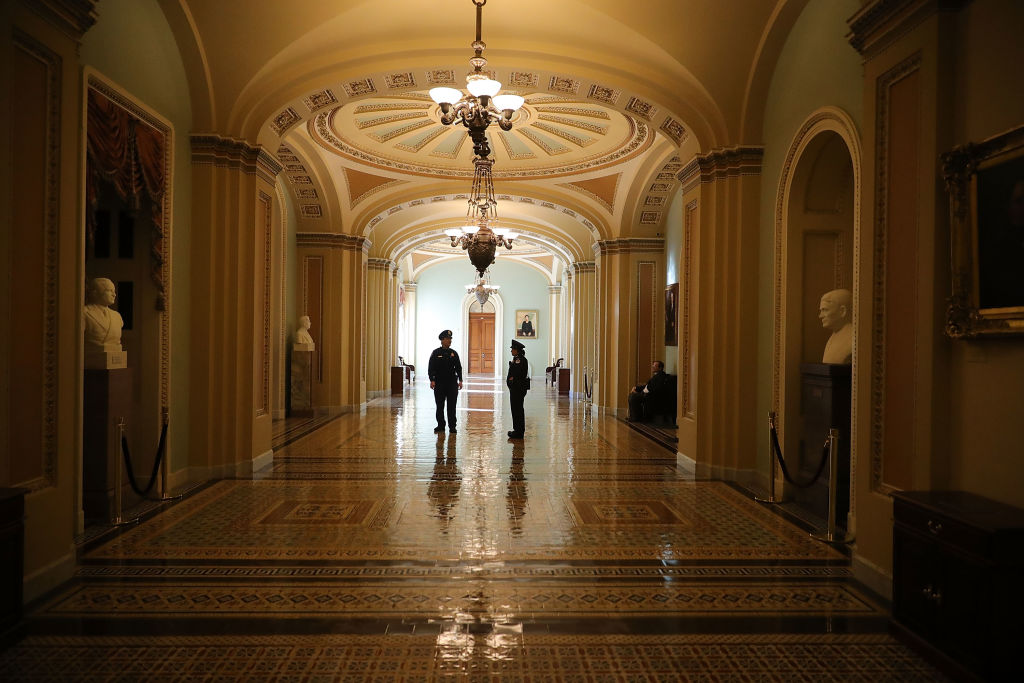Congress set to vote on bipartisan spending package


A free daily email with the biggest news stories of the day – and the best features from TheWeek.com
You are now subscribed
Your newsletter sign-up was successful
Congress is expected to vote Thursday on a bipartisan budget deal worth nearly $400 billion. The two-year deal includes a roughly $300 billion bump for military spending and domestic programs, as well as nearly $90 billion for disaster relief.
The bill's passage would finance the federal government until September and allow Congress to work on a more robust long-term budget bill, The New York Times says. Additionally, the budget includes compromises meant to placate both Democrats and Republicans, including $6 billion to fight the opioid crisis and $4 billion to fund health care for veterans.
But many Democrats, including House Minority Leader Nancy Pelosi (Calif.), are hesitant to support the bill because it doesn't include a path to citizenship for young undocumented immigrants, also known as DREAMers. Pelosi, however, has reportedly avoided demanding that her Democratic colleagues formally oppose the spending bill. Other Democrats like Rep. John Yarmuth (Ky.), who sits on the House Budget Committee, say the bill needs to pass: "If Democrats cannot support this kind of compromise, Congress will never function."
The Week
Escape your echo chamber. Get the facts behind the news, plus analysis from multiple perspectives.

Sign up for The Week's Free Newsletters
From our morning news briefing to a weekly Good News Newsletter, get the best of The Week delivered directly to your inbox.
From our morning news briefing to a weekly Good News Newsletter, get the best of The Week delivered directly to your inbox.
Senate Majority Leader Mitch McConnell (R-Ky.) admitted the proposal was far from "a perfect bill," but called it "our best chance … to make progress on issues directly affecting the American people."
The bill is not without its opponents on the other side of the aisle. Fiscal conservatives, like Sens. Bob Corker (R-Tenn.) and Rand Paul (R-Ky.), have raised concerns about its cost. The bill "[doubles] down on the irresponsible mentality in Congress of spend-now-pay-later," Corker said. On Wednesday night, the conservative House Freedom Caucus announced its opposition to the bill, saying that "growing the size of government by 13 percent is not what the voters sent us here to do."
Ryan predicted Thursday that the proposal would pass his chamber. Without a deal, the government will shut down Friday.
A free daily email with the biggest news stories of the day – and the best features from TheWeek.com
Kelly O'Meara Morales is a staff writer at The Week. He graduated from Sarah Lawrence College and studied Middle Eastern history and nonfiction writing amongst other esoteric subjects. When not compulsively checking Twitter, he writes and records music, subsists on tacos, and watches basketball.
-
 ‘Restaurateurs have become millionaires’
‘Restaurateurs have become millionaires’Instant Opinion Opinion, comment and editorials of the day
-
 Earth is rapidly approaching a ‘hothouse’ trajectory of warming
Earth is rapidly approaching a ‘hothouse’ trajectory of warmingThe explainer It may become impossible to fix
-
 Health insurance: Premiums soar as ACA subsidies end
Health insurance: Premiums soar as ACA subsidies endFeature 1.4 million people have dropped coverage
-
 ‘One Battle After Another’ wins Critics Choice honors
‘One Battle After Another’ wins Critics Choice honorsSpeed Read Paul Thomas Anderson’s latest film, which stars Leonardo DiCaprio, won best picture at the 31st Critics Choice Awards
-
 Son arrested over killing of Rob and Michele Reiner
Son arrested over killing of Rob and Michele ReinerSpeed Read Nick, the 32-year-old son of Hollywood director Rob Reiner, has been booked for the murder of his parents
-
 Rob Reiner, wife dead in ‘apparent homicide’
Rob Reiner, wife dead in ‘apparent homicide’speed read The Reiners, found in their Los Angeles home, ‘had injuries consistent with being stabbed’
-
 Hungary’s Krasznahorkai wins Nobel for literature
Hungary’s Krasznahorkai wins Nobel for literatureSpeed Read László Krasznahorkai is the author of acclaimed novels like ‘The Melancholy of Resistance’ and ‘Satantango’
-
 Primatologist Jane Goodall dies at 91
Primatologist Jane Goodall dies at 91Speed Read She rose to fame following her groundbreaking field research with chimpanzees
-
 Florida erases rainbow crosswalk at Pulse nightclub
Florida erases rainbow crosswalk at Pulse nightclubSpeed Read The colorful crosswalk was outside the former LGBTQ nightclub where 49 people were killed in a 2016 shooting
-
 Trump says Smithsonian too focused on slavery's ills
Trump says Smithsonian too focused on slavery's illsSpeed Read The president would prefer the museum to highlight 'success,' 'brightness' and 'the future'
-
 Trump to host Kennedy Honors for Kiss, Stallone
Trump to host Kennedy Honors for Kiss, StalloneSpeed Read Actor Sylvester Stallone and the glam-rock band Kiss were among those named as this year's inductees
